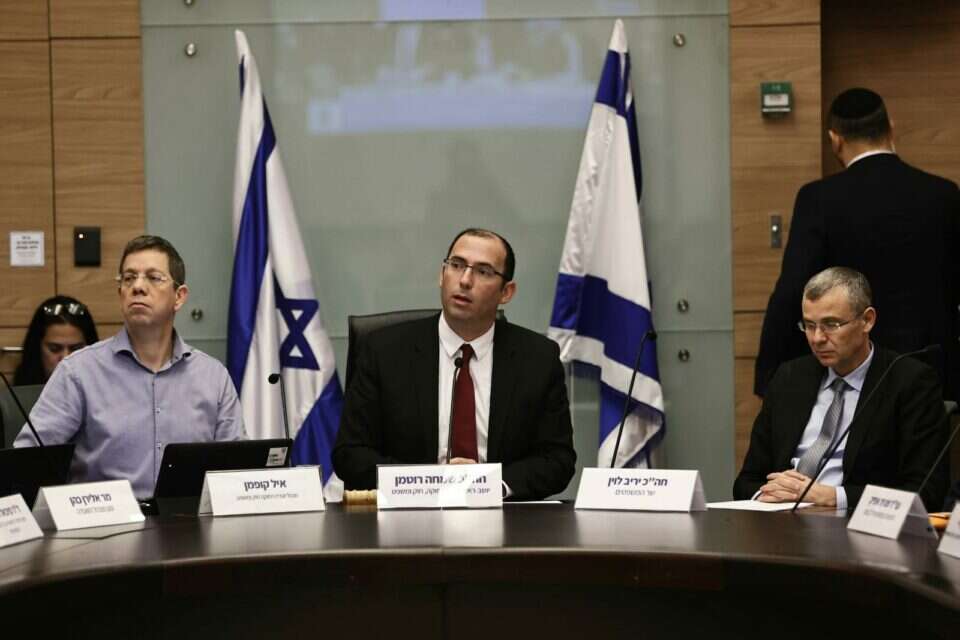Those who follow the flawed procedures in the hearings of the Knesset's Constitution, Law and Justice Committee are impressed by the wholesale removal of interim readings from the committee - members of the Knesset and guest-minds.
The chairman of the committee in the past points out that there was no precedent for this. The Constitution Committee in the Knesset was known for its in-depth discussions with the participation of all its members, for the opportunities given to express different positions and for listening to the plights of the participants who sometimes drained into intermissions.
This is not how things are today - only a combination of dullness to traditional procedures, a deaf ear to hardships and ignoring the Jewish heritage can explain this puzzling behavior.
The merit of the cry - the cry of the poor - a place of honor in Jewish heritage;
Respectful attention to the "discourse of those in need".
The goal: to voice the plight of the individual
The right to shout was not invented by Yosef Chaim Brenner at the founding conference of the Histadrut, on Hanukkah 1920. During this historic meeting, Brenner burst out at the speaker's words. The chairman of the conference reminded him that he was not a delegate, and therefore did not have permission to speak.
Brenner, for his part, was not obliged: "I don't have the right to speak, but I do have the right to shout."
The right to shout was preserved for many years in Israeli communities.
She expressed herself by delaying the prayer that her express intention was to attract attention in order to voice the plight of the individual in public.
The first evidence of this is almost two thousand years old.
They are already found in the Land of Israel in the third century, and they return in examples from communities under the rule of Islam and Christianity.
The delay in disrupting order is intended to reduce acts of injustice and harm to the weak.
The communities respected this right, if only because of the religious duty of a "holy community" to respond to the cry of the individual, because the prayer is not heard if there is a fear of injustice towards others.
As the verse says: "And because of you, my eyes are lifted up from you because you have increased your prayer. I have not heard your hands full of blood" (Isaiah 1:15).
To listen - a traditional democratic aspect
The historical evidence is about various petitioners and shouters, including: an old father whose son refused to support him, petitioners whose cases were postponed and those about whom shameful rumors were spread (shaming).
The most prominent of the petitioners in the way of the cries were orphans and women, and the wording repeats in a similar way: "The petitioner cries out to you for help (in Jewish Arabic: Vaked Kounat Astagath Elichem - Mbash) just as a daughter of Israel must cry out for help to the judges of the House of Israel and to the communities of Israel."
In one of the series of silencing of those who shouted their pain before the plenary of the committee, the chairman Simcha Rothman repeated his harsh words against the shouters: "There is nothing that symbolizes the lack of respect for democracy and the culture of debate than what we have seen." His words could have been understood if the shouters had closed their mouths or Trying to disrupt the ability to debate legislation.
But the readers wanted to make their voices heard, the growling of their hearts, and they did so after the chairman stopped them from speaking repeatedly. To shout when the avenues of speech were blocked is an honorable and rooted Jewish right, and one of the most democratic aspects of our tradition.
"The right of speech to the Holy Society"
Green's song (according to the band "Tractor's Revenge") about the "right to shout" following Brenner is good for expressing the power of the feeling of the crying poor, the one who is blocked by a wall from the possibility of expression without a way out:
The permission of the bee for a knife friend
The permission of the bee for friend Fahd
The permission of the bee for a friend of despair
The permission of the bee to a friend in a huff
The right to shout to me, the right to shout to me
The right to shout to me, the right to shout to me
The right to speak to a foreign friend
permission to speak to a lost friend
The right of the bee to the holy company
Shout out to me
The Jewish right to shout was essential and important to the management of public life for hundreds of years.
It is essential to remember her even today.
It actually mentions the right of petitioners nowadays to stand before the judicial system, a right that is also threatened by the regime coup at our gates.
The Chairman of the Constitution Committee claims his right to silence others in the name of democracy and tradition. Both are also against him, precisely with those who shout at the crowd.
Prof. Menachem Ben-Shashon, chairman of the Constitution, Law and Justice Committee in the 17th Knesset, is the governor of the Hebrew University of Jerusalem and a researcher of the history of the people of Israel in Islamic countries
Were we wrong?
We will fix it!
If you found an error in the article, we would appreciate it if you shared it with us

